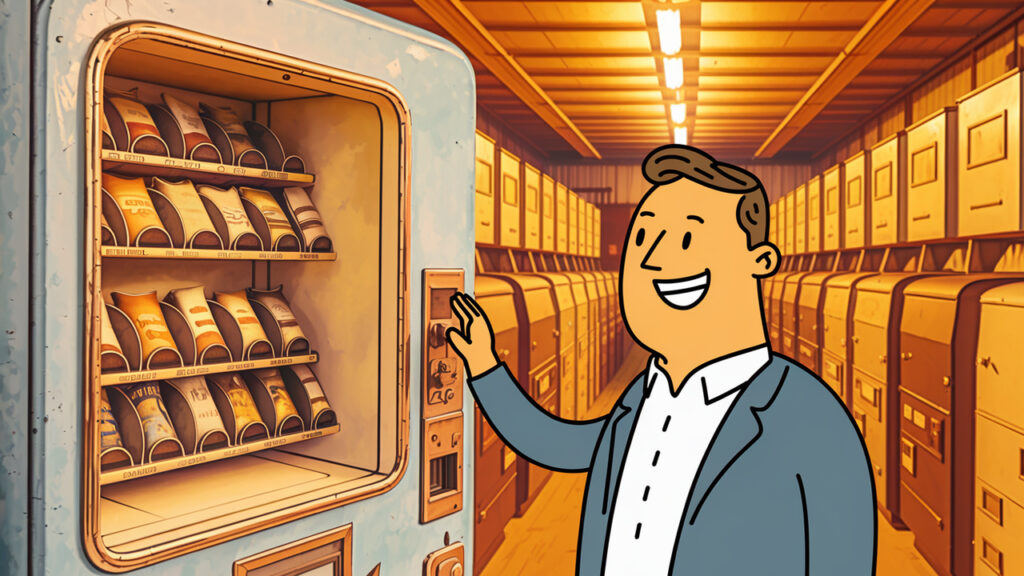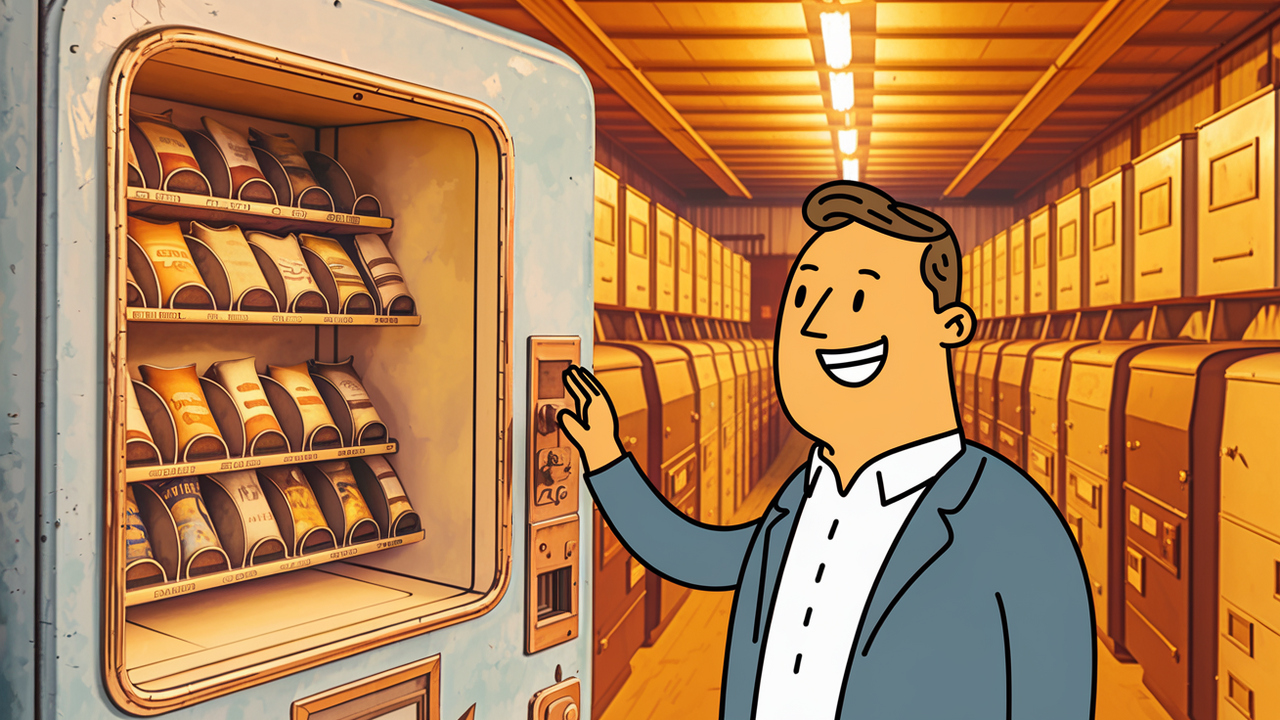Where to Buy Used Vending Machines Without Getting Scammed
Buying a used vending machine can be a smart way to lower startup costs — but it’s also where many new vending operators make their first big mistake. From broken refrigeration systems to fake listings on Craigslist, the used vending market has its fair share of risks.
In this post, I’ll show you where to buy used vending machines safely, what red flags to avoid, and how to protect yourself before spending a dime.

Table of Contents
Featured Snippet
Where can I buy used vending machines without getting scammed?
Buy from reputable vending equipment dealers, not individual sellers on unverified platforms. Look for companies like A&M Equipment Sales, Vending.com (Refurbished section), VendTek Wholesale, and The Discount Vending Store. Always ask for warranty details, machine history, and service documentation.
Why Buy Used?
Used vending machines typically cost 30%–60% less than new ones, making them ideal for beginners or operators expanding a route on a tight budget. You can often get a fully functioning drink, snack, or combo machine for under $2,500 — if you buy smart.
But if you’re not careful, you could end up with a unit that has bad refrigeration, outdated tech, or worse — one that doesn’t even turn on.
Trusted Places to Buy Used Vending Machines
1. A&M Equipment Sales
- Family-owned, industry trusted
- Offers refurbished and fully tested machines
- Includes warranty and tech support
- Nationwide shipping available
2. The Discount Vending Store
- Specializes in refurbished and inspected machines
- Includes lifetime phone support
- Machines often include cashless readers
3. VendTek Wholesale Equipment
- Large inventory of used and rebuilt machines
- Transparent pricing and in-house servicing
- Offers help with delivery and parts
4. Vending.com – Refurbished Machines
- Factory-refurbished vending equipment
- Backed by a professional team and warranties
- Upgrade options for payment systems and branding
Platforms to Use With Caution
- Craigslist, Facebook Marketplace, OfferUp – While you can find decent machines here, these platforms are full of scams and broken machines. Avoid unless you’re experienced and buying locally in person.
- eBay – Only buy from sellers with high ratings and include buyer protection, photos, and a warranty or return policy.
Red Flags to Watch Out For
- No serial number or brand label – That’s a sign the machine may be stolen or too old to support.
- Seller refuses video call or inspection – If they won’t show the machine working, walk away.
- “Sold as-is” with no details – These machines may be non-functional or missing parts.
- Cash-only payment requests – Always pay through secure methods like PayPal, a business invoice, or financing.
What to Ask Before You Buy
- Has the machine been tested?
- What was replaced or serviced?
- How old is the compressor, bill validator, and coin mech?
- Is it MDB-compatible (Modern payment ready)?
- Does it come with a key and owner’s manual?
- Can I see a video or photo of it powered on?
These questions help you avoid lemons and focus on machines that are vending-ready.
Quick Buyer Checklist
✔ Buy from a known vending dealer or trusted warehouse
✔ Get the serial number and manufacturer info
✔ Ask for a video showing the machine operating
✔ Confirm what’s included (coin mech, bill acceptor, shelves)
✔ Make sure parts are still available for that model
✔ Always get a written receipt or invoice
Final Thoughts
Buying a used vending machine doesn’t have to be risky — but it does require you to slow down, do your homework, and avoid too-good-to-be-true deals. Stick with verified vendors, demand proof of function, and protect yourself with documentation.
The money you save upfront is only worth it if your machine works day one and keeps earning long-term.
One major advantage of buying from a refurbished vending dealer is peace of mind. These companies typically clean, test, and replace essential components like motors, locks, bill validators, and refrigeration units before reselling — reducing your risk of equipment failure after setup.
A good refurbished machine should include a warranty, even if it’s only 30 to 90 days. This shows the seller is confident in the machine’s working condition and gives you time to identify any hidden issues once you begin regular use.
If you’re just starting out and don’t have thousands to spend, many dealers offer financing for refurbished machines, which can help you get started with low monthly payments. This also ensures you’re working with a company that operates above board.
Make sure the machine you’re buying is MDB-compatible, which means it can be upgraded with modern card readers and mobile payment systems. Non-MDB machines may look fine on the outside but often aren’t suitable for today’s cashless customers.
Don’t assume that every “working” machine is actually ready for business. A vending machine that powers on isn’t necessarily functional if the coin mech is missing, the trays are bent, or the refrigeration isn’t holding temperature.
When shopping online, always ask for multiple photos — including close-ups of the interior, payment system, and serial number. If the seller refuses or only shows stock images, that’s a strong red flag.
Avoid buying machines older than 10–12 years unless you’re an experienced technician. Parts can be hard to find for outdated models, and older machines may not meet ADA or energy efficiency standards required in public venues.
One smart move is to call the manufacturer of the model you’re considering and ask if parts and service are still supported. If they tell you the machine is discontinued, skip it — even a $1,000 discount won’t make up for long-term repair costs.
Look for machines from well-known brands like Seaga, Crane National, AMS, USI/Wittern, Royal, or Dixie Narco. These companies have reliable parts support and dealer networks that make long-term ownership easier.
If you’re planning to scale your vending route, try to buy multiple units of the same model. This simplifies stocking, servicing, and training. Plus, spare parts and keys will often be interchangeable between machines.
Don’t forget to inspect or ask about shipping and delivery costs. A “cheap” vending machine might cost an extra $400+ to ship if it’s across the country or requires liftgate service. Ask for an all-in price before sending payment.
Lastly, document everything. Get a written invoice, proof of condition, and clear communication via email or text. These records protect you in case the machine doesn’t arrive as described or needs a refund/dispute.

